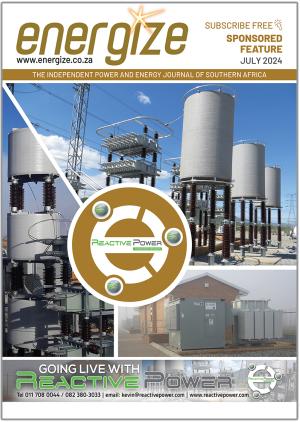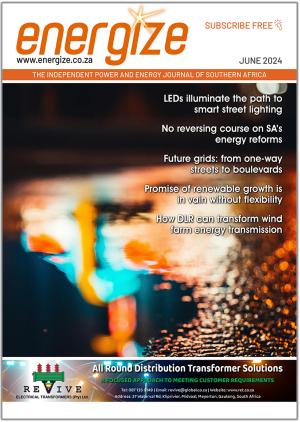Opinion piece by Werner Fortuin, SolarAfrica
Solar PV Energy is an important part of our country’s energy mix and will play an important role in resolving the energy crisis for many years. However, many service providers in the industry are still effectively ‘unregulated’. Although prudent developers, EPCs and installers follow the applicable NRS, SANS and IEC standards to ensure the safety and performance of their installations, unregulated service providers do not, and are blissfully unaware of the consequences of their actions. Here are some of the dangers posed by unregulated installations and what we should be looking for when choosing solar providers.

As load shedding woes continue, there has been a surge in the adoption of solar energy to keep the country’s business sector ticking over. However, in this booming industry, a dangerous trend has emerged - the rise of unregulated solar power service providers.
To offer support and guidance, the South African Photovoltaic Industry Association (SAPVIA) is one of the organisations that promotes, develops, and grows the PV industry in South Africa. SAPVIA offers members access to policy updates, market trends, and new technologies to promote a more regulated quality of installations. SAPVIA already has more than 700 members, and regularly hosts working groups to address and solve various industry-related topics. Unfortunately, many service providers still opt out of the voluntary membership.
In Johannesburg alone, it is estimated that there are more than 20 000 unregistered solar systems. Many of these are residential, and many belong to SMMEs. While some may argue that unregulated service providers provide cheaper options for consumers, the hidden dangers they present far outweigh any short-term savings. While compliance to regulation and good quality standards can increase costs, these costs are quantifiable and can be justified through a prudent cost-benefit analysis. However, the cost of non-compliance is not, and costs related to damage to people, property and equipment can be exponentially higher.
A lack of compliance in the industry poses a significant threat to both consumers and the broader solar energy industry. Unlike certified and licensed installers, non-compliant providers often lack the necessary training, expertise, and knowledge to design and implement systems safely and efficiently. Consequently, the chances of non-compliant installations, subpar equipment, and inadequate maintenance increase significantly. These risks can lead to reduced energy output, higher costs, and even hazardous conditions that put the safety of onsite employees, as well as property, at risk.
One of the most concerning aspects of non-compliant solar service providers is the use of cheap and unreliable components. By cutting corners to save costs and optimise profits, 'fly-by-night' operators pose a massive risk to their customers as they cannot ensure the long-term performance and safety of the systems and installations.
Another potential risk that comes with non-compliant solar systems is the possibility of rejected insurance claims, higher insurance premiums and deductibles, and in some cases the inability to insure your assets. This could leave businesses unprotected in the case of accidents or damages resulting from faulty installations. Reputable companies carry liability insurance which provides essential protection to business owners against any mishaps or property damage that might occur during or after the installation process. Without this coverage, businesses may be left with hefty repair bills or face legal battles if issues arise due to poor workmanship.
A case in point is the increase in the number of complaints related to buying and installing solar systems and generators from the Consumer Goods and Services Ombud (CGSO) office. The CGSO received 202 complaints between February 2022 and 9 February 2023. These included compliance certificates not being issued, payment accepted but goods undelivered, and systems not installed within agreed time frames. In addition, almost half of these suppliers refuse to cooperate with the office when it conducts investigations. It simply is not worth the risk.
On a positive note, Gauteng Premier Panyaza Lesufi recently announced that SAPVIA has endorsed the Gauteng government’s programme to train 6000 people as solar system installers. On completion of the 12-month solar system training initiative, the graduates will receive an NQF level 5 qualification. The association will be overseeing the training and the curriculum to ensure it meets its standards. These are the kind of government initiatives that are not only necessary to ensure that providers are accredited but can also positively contribute to the economy through skills development.
Governments and municipalities can play an even more active part by doing mandatory inspections for example, to ensure quality of installations, whether the buildings are structurally sound, and components are maintained. We have come a long way, but there is still a long road ahead in terms of ensuring widespread compliance to standards and good engineering practices.
Business owners who want to install a solar system have the responsibility to conduct thorough research before choosing a provider. It’s important to do your research and check for proper licensing, certifications, and customer reviews. Reputable solar installation companies will be transparent about their qualifications and are more likely to deliver high-quality, long-lasting solar systems that meet your energy needs effectively. SolarAfrica has robust quality management systems, and strict Engineering, Procurement and Construction (EPC) guidelines to ensure our systems are compliant with local and global standards. Additionally, SolarAfrica has an in-house quality department that performs quality control checks throughout the project lifecycle as well as conducts regular audits to ensure compliance. We only use trusted contractors who are 100% transparent with their work records which we thoroughly vet. These should be non-negotiable standards for people seeking providers.
The C&I solar industry is set to see rapid growth over the next few years and will play a massive part in the South African energy mix. There is no doubt that as it grows it will become heavily regulated which would be of huge benefit to us all. But until that day, we need to work together – providers, industry associations, government, and consumers – to ensure that the future stays bright. The safest way possible.

















